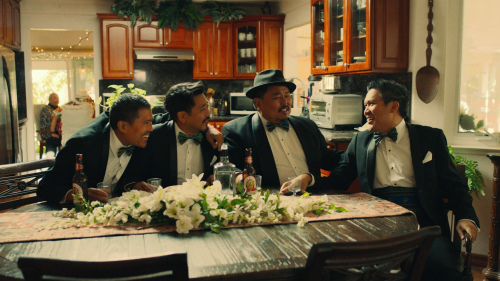
Andrea Walter
MOVIE REVIEW
The Fabulous Filipino Brothers (2021)
Director Dante Basco and three of his siblings co-wrote “The Fabulous Filipino Brothers,” a boisterous comedy set in Pittsburg, Calif. They, along with another brother, also co-star in the film, which centers on events leading up to wedding festivities and presents four distinctive Asian male archetypes that challenge the omnipresent stereotypes in American cinema – they don’t even speak Tagalog, they’ll have you know – but the filmmakers also make it abundantly clear, on at least one occasion, that the film is mostly for the edification of white people.
We get to know their Smurfs nicknames before their actual legal names: David (Dionysio Basco, also cowriter) is the comedian who has spent his formative years singing and dancing in talent shows at the Filipino-American Cultural Center; Dayo (Derek Basco) is the eldest who feels obligated to pony up cash for the feast yet irresponsibly gambles all the money away; Duke (Dante Basco) is the womanizer who reconnects with an old flame while in Manila for business, only to find that she’s now married with a child; and Danny Boy (Darion Basco, also cowriter) is a New-Agey shut-in who devotes his days to making electronic music. Oh, there’s also Dores (Arianna Basco, also cowriter), a nurse who is also the narrator.
Parts of the film are very refreshing and funny indeed, though it’s hard to tell how much of it is meant as in-joke among Filipino Americans. These guys are certainly not the model minority, as they dabble in gambling, roll with gangsters, commit adultery etc., but is it necessary for them to call themselves “jungle Asians” for a few measly chuckles? In due time we find out who’s getting hitched – which is a shock, since none of them register as marriage material even if they have spouses. Although the film establishes that, culturally, Filipinos do not ever fly too far from the nest, it never meaningfully fleshes out the ties that bind – especially the brotherhood, given the title – the way that, say, “Bo Gia (Dad, I’m Sorry)” does.
Comments